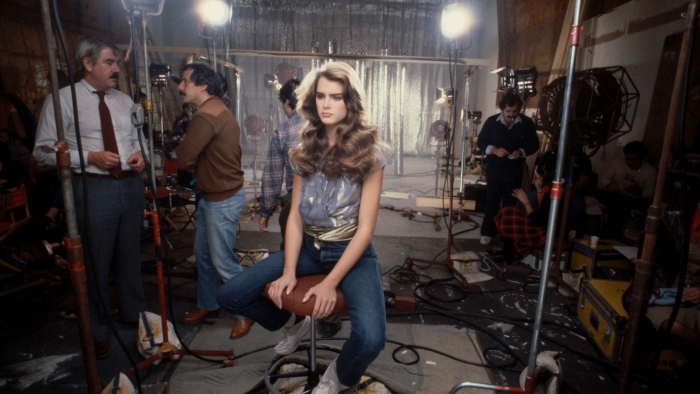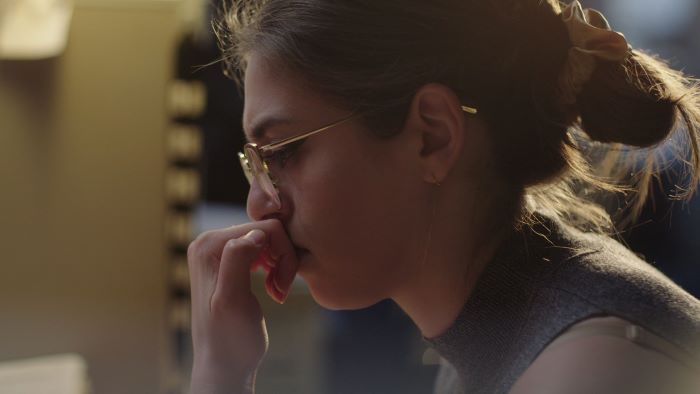There were roughly 85 feature films that premiered at Sundance searching for distribution. The fate of many will not be known for a while, but there were many high-profile acquisitions in the $20 million range to look out for, such as Flora and Son, acquired by Apple TV+, and Fair Play, bought by Netflix. Still, there are plenty of other titles that will be available in the next several months, such as the three below, given that roughly 20 percent of the features at Sundance arrived with a distributor attached.
Cassandro
Gael García Bernal tentatively transforms himself as the real-life Saùl Armendáriz, the lucha libre wrestler who became a star under the persona of Cassandro. With bleached blond hair and blue eyeshadow, his alter ego broke the mold in Mexican wrestling. Instead of playing the stereotypical exótico—the flamboyant, queer character that always ends up on the ropes and tossed out of the ring—he crafted a prancing persona that would be proudly gay, fight back, and triumph, turning homophobic jeers to cheers.
However, for this underdog tale, the excitement slowly builds. In many fight scenes, the camera is placed outside the ring. It is not until a career-defining match for Cassandro that director Roger Ross Williams’s camera jumps into the ring and the body slamming becomes up close and visceral.
The filmmakers are perhaps hoping viewers are not aware of the 2019 documentary Cassandro, the Exotico!, in which the real-life wrestler holds court and is more relaxed, physically free, and lively than he’s portrayed in the biopic. The more contemplative García Bernal goes through the motions and takes his knocks in the ring, but for those who have seen the real deal, there is no competition. On a scale from Tom Hanks’s buttoned-up Philadelphia lawyer to William Hurt’s flaming queen in Kiss of the Spider Woman, García Bernal leans much more toward Hanks. (Amazon Studios)

A teenaged Brooke Shields, circa 1980, as seen in Pretty Baby: Brooke Shields (Getty/Sundance Institute)
Pretty Baby: Brooke Shields
Is there anything new in this two-part series, a 136-minute biography produced by ABC News Studios about someone who was once described as “the most photographed woman in the world”? Yes, but the documentary’s intent is not to dish, but to inform. For the first time publicly, model/celebrity/actress/Broadway star Brooke Shields reveals she was sexually assaulted by an unnamed filmmaker in the late 1980s, who, as a ruse, said he was considering her for a role. Director Lana Wilson places Shields in the center of the discourse on how the entertainment industry and the media treat women, while acknowledging Shields has had an atypical career.
Even those who have tried to keep up with her six-decade career, whether through People magazine or in the news (her kerfuffle with Tom Cruise regarding postpartum depression), there is a lot to take in here. For example, as a teenager, Shields had to undergo sex-shaming questioning by attorneys in a lawsuit when she and her momager, Teri, tried to prevent the publication of a photography book, which featured nude photos of Shields taken when she was 11. There is also her side of her marriage story with tennis star Andre Agassi. She is more diplomatic than her ex’s account in his 2009 autobiography, Open. However, former boyfriend Dean Cain comes out like the ideal first love.
Told with talking heads and a barrage of clips and photos (naturally), her story is abetted by close friends and associates, which leads to one more revelation: Shields and Laura Linney were close teenage friends—both raised by single mothers. Linney backs up Shields’s account of life with the model’s mother: When Teri was intoxicated, it was time to “duck and cover.”
For more on the making of the ultra-controversial 1978 film Pretty Baby, directed by Louis Malle and starring a 12-year-old Shields, listen to the podcast You Must Remember This, episode six in the season focused on “Polly Platt, the Invisible Woman,” about the film’s screenwriter. (Hulu)
Victim/Suspect
Director Nancy Schwartzman made one of the best films of 2019, Roll Red Roll. It uncovered a scandal in Steubenville, Ohio, that involved the rape of a minor that played out on social media. This year, the filmmaker arrived at Sundance for the first time with another powerful, hard-hitting investigative documentary.
Schwarzman follows reporter Rachel de Leon of the Center for Investigative Reporting as she pounds the pavement for her first solo investigative piece. Over a period of years, the young journalist uncovers a pattern of behavior regarding how police departments nationwide have treated women who have come forward with allegations of sexual assault. She has tallied more than 200 cases in which the women, often in their late teens or early 20s, face charges of false reporting after coming forward. De Leon tracks down how the police turned the tables on Emma Mannion, a student at the University of Alabama who reported a rape, and Dyanie Bermeo, a criminal justice student in Virginia, who said she was assaulted by a man who was likely impersonating a cop.
One commonality in the cases recounted here is that the police, during the course of investigation, lied, believing a ruse would lead to answers. Schwartzman reached out to the law enforcement officials involved, and all but two cops declined to be interviewed. However, Carl Hershman, a San Diego police officer for 32 years who worked in a sex crimes unit, stands in for the good cops (“Inconsistences [in interviews] aren’t a red flag.”)
While the film debunks the myth of widespread Gone Girl–fake–rape scenarios, it unfortunately reinforces the possibility that when one encounters the law, either as a victim or a suspect, one might need to lawyer up immediately. (Netflix)


















Leave A Comment